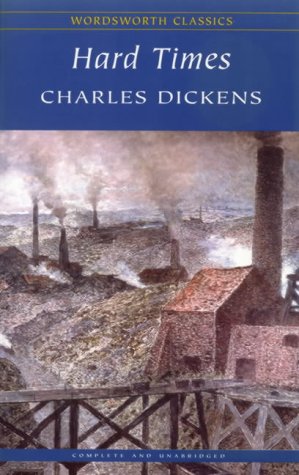Hard Times, by Charles Dickens
 An unintentionally appropriate choice for the last book I read before heading out to Connecticut, I suppose.
An unintentionally appropriate choice for the last book I read before heading out to Connecticut, I suppose.Just kidding—work's going great, but since talking about my life is not what this blog's for, to the book...
I am embarrassed to admit that my familiarity with Dickens lies primarily far in the past; his stories enchanted me when I was in middle school—reading David Copperfield then is still one of my most beloved literary experiences and perhaps the highlight of those three dreary years—but I have not decided to return to him. Furthermore, because I was mostly reading at that young age, my exposure to his works has excluded his more "serious" or more "mature" works—Our Mutual Friend, Bleak House, and Hard Times.
I was not quite so enamoured with Dickens this time around, perhaps because it is quite difficult to connect personally with the author. I felt as if I were David Copperfield and suffered with him at the thought that Agnes may indeed be unattainable, only to rejoice to know that she was not. I felt the bullying friendship of Steerforth; I wept with Mr. Micawber; I recoiled before Uriah Heep; I laughed with Barkis and the Peggotys.
It is not, of course, that Hard Times is any poorer in great and memorable characters—the Gradgrinds are indelible, and oh! poor Stephen Blackpool. It is, I suppose, a natural outcome of depicting a grinding and quotidian, as opposed to an intense and mysterious tragedy that makes Hard Times less alluring, less involving.
But what I lost in emotive appreciation, I more than gained in artistic appreciation. While Dickens can, as is well-known, prodigally and sloppily spill his vivid characters all over the place while brewing his tale, or leave them languishing on back-burners never to be properly retrieved (poor Sissy Jupe! she could have been such a great character had she been given more attention), there is really no satisfactory way of accounting for Dickens's mastery in characterization.
Of course, a number of critics—many of them, in fact—find what I call his "mastery" to be an indecent form of chicanery, a circus show (appropriately for this novel), a parade of gargoyles with few supporting arches or pillars. James Wood has complained that Dickens's way with character has triumphed overwhelmingly in an era in which we are not too sure what to do with the idea of character. For writers like Rushdie, DeLillo, Whitehead, or Zadie Smith, he believes, Dicken's profligate use of caricature to define character, shallowness of motivation, and flatness of interiority represent a diminution of the novel's—and the novelist's—powers. Worse, he says, they have abandoned the pursuit of real feeling.
I demur rather diffidently from Wood's judgment, for I have no real love of "hysterical realism." I do, however, feel that Dickens's access to deep and powerful sentiment is not his only strength, and that his "gargoyles" are not a weakness for his or anyone else's novels—at least not inherently.
I often excuse myself from Wood's aesthetic asceticism by thinking that there is no necessary reason why novels should be only about the individual consciousness and the oddities and quiddities thereof, that sometimes we need a Dickensian gargoyle to bring light (paradoxically) to our literary lives. Certainly, I find it odd that Wood's greatest exemplar of his preferred type of realism—the type which he all but calls the creed and the catechism of the novel—is not a novelist, but a short story writer and playwright—Chekhov.
Wood's great strength as a critic is his consistent adherence to a set of aesthetic principles which he actually does a remarkable job of defending and explaining. One would never find him saying, "I don't know why, but I just looooove this book!" He always seems to know why, and can explain why, and that's a model I believe we should all follow.
But I do believe his principles are, to use a phrase of his concerning the novels of Coetzee, "intelligently starved"—which of course does not mean that they are starved of intellect (patently they are not, though neither are they glutted), but rather that they are starved purposefully by an intelligent mind. Their meat is withheld to better examine their anatomy. Unfortunately, being starved, while offering the benefit of marking their limits more clearly, have the disadvantage of drawing those limits unnaturally close to the core, to the skeleton.
I have spoken a great deal about Wood in a number of posts—so far this blog seems to be more about him than about what I'm reading. Principally that's because I've been working my way through both of his volumes of essays. My hope was to begin my post-collegiate literary study reading the thoughts of critics who had the most solid and consistent literary and aesthetic ideologies I could think of—Trilling and Wood. I read some Trilling and was greatly affected, but Wood presents an even greater order of a challenge. Sometimes Trilling will merely write in simple appreciation of a writer; if he's advancing anything, it's a commitment to a staid and venerable humanism. Wood, even in appreciation, writes disquisitions. One must pay attention and reflect, or one gets nothing out of reading him. I hope to write about him less and advance my own opinions independent of him more, but I will readily admit that I could hope for nothing better than to sound a bit like him.
Comments
Fact Fact Fact!